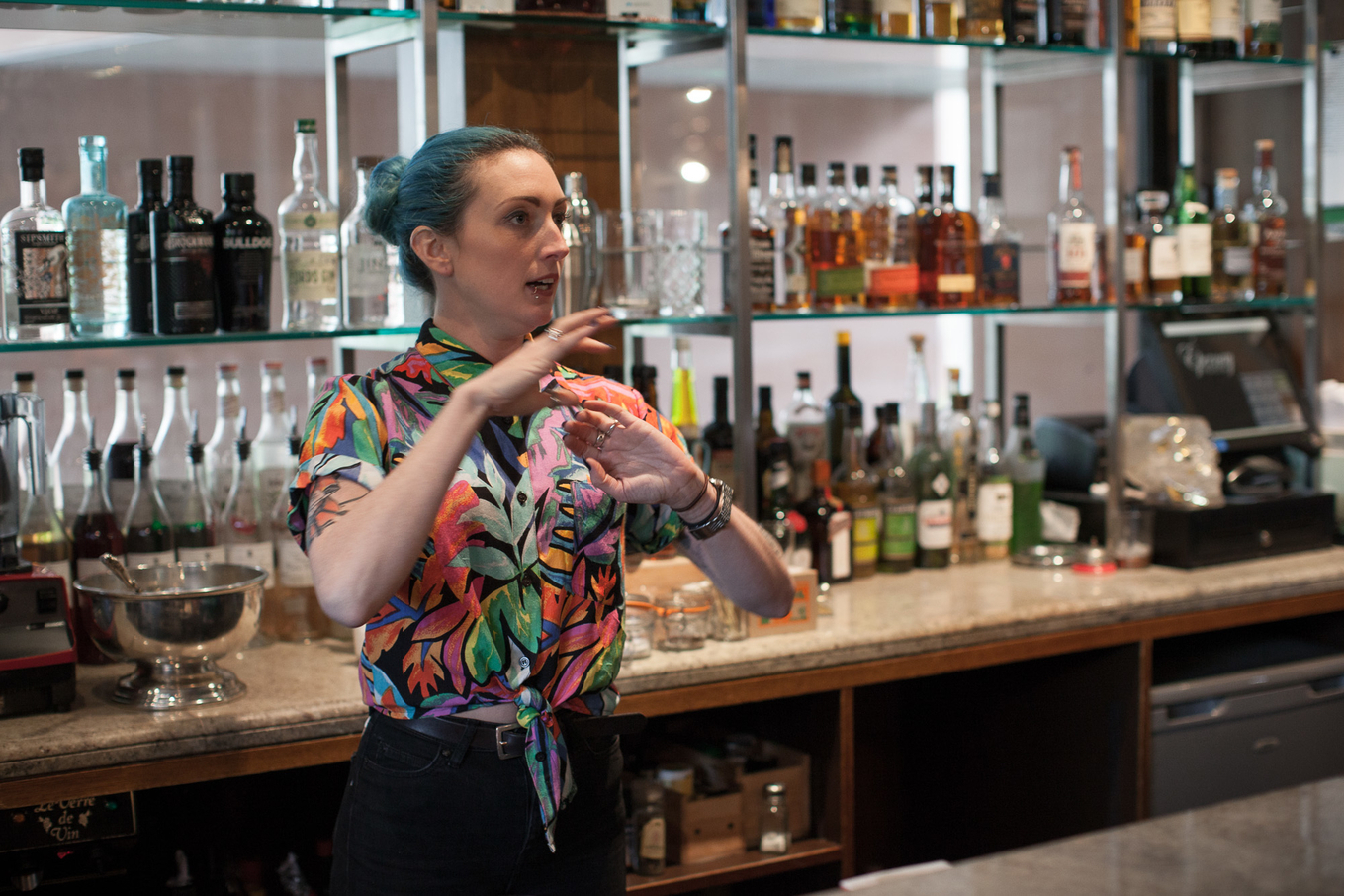Are you a Discerning Drinker?
Join thousands of like-minded professionals and cocktail enthusiasts, receive our weekly newsletters and see pages produced by our community for fellow Discerning Drinkers.
Words by Iain Griffiths and Kelsey Ramage (paraphrased)
Photography by Film by Alicja Rymarowicz
Iain Griffiths and Kelsey Ramage “make drinks out of would-be garbage”. They recently presented their Trash Tiki concept as part of Bacardi Brown-Forman's (BBF) Jigger, Beaker, Glass Tour which sees industry personalities and BBF ambassadors sharing their knowledge and experiences. We recorded Iain and Kelsey's presentation to produce this paraphrased inspirational summary of what Trash Tiki is.

Iain Griffiths: "Anyone heard of Trash Tiki before? They're anti-waste drinks that taste OK and don't f**k the planet. That's the basic premise of it all.
We're not turning around and saying, 'these are the best drinks you will ever try in your life', and we'll get into why we don't think that's the case. We're certainly not trying to put ourselves up for any awards with this; in fact, the business model is based on the notion that we will one day become irrelevant. It's the worst business model in the world. But, we'll have some fun doing it and we won't sell out. That's very important.
What is Trash Tiki? What can you take away from this? We want you to copy us, follow what we're doing. We have gone to extremes with this concept, but hopefully everybody can take a little bit from what we're doing and incorporate in what you do. We are completely open-source, there are no secrets; every single recipe is, or will be, available on trashtikisucks.com.
One of the biggest issues we want to address with Trash Tiki is to kill sustainability - it's a word we hate. We want to remove sustainability from the lexicon of every bartender, food writer and everybody else around the world, because it's a dull, boring, cold, emotionless word that evokes no inspiration.
Environmental consciousness, anti-waste, zero waste, reduced waste, whatever else you want to call it, but use words or terms with some emotion about them. We really want to put emotion back into this topic, and get people motivated."

Kelsey Ramage: "So, we're looking at waste that's already being created in bars, and making drinks from it. By the time we throw things out, there is literally not a drop of anything left in that piece of orange husk, or whatever other fruit that previously was just used for juicing.
While we are doing Trash Tiki from someone else's waste, we want to give you guys our recipes so you can look at what you're throwing away. That might be slightly different from the waste items we've used, but by using the model we've created on trashtikisucks.com, you can just do your own thing."

Iain Griffiths: "Dandelyan ... and the Lyan Company, that we're both part of, has a reputation for being weird and wonderful, and we're proud of that; we're proud of our time with that company. As somebody that helped found it, I'm achingly proud of it all. But the point with this is that everybody can do this. You literally need buckets to be able to do what we do. There is no distillation of anything."

Kelsey Ramage: "A lot of the time you hear the word 'sustainability', it's used to market a product that will allow you to build a sustainable system. We already have a system and the recipes that we're applying in our own bars. We've keep it as accessible as possible, so the equipment is as basic as a bucket, a strainer and maybe a muddler. Our methods and recipes allow you to make cocktails with the stuff that you already have in your bar. So you don't have buy anything ... other than maybe acids, or sugar from Amazon, but most bars already have the things required."

Iain Griffiths: "We probably wouldn't have been able to activate this concept any earlier in the trajectory of bartending. It feels like bar culture has reached that perfect point. When you say citric acid, the majority of people don't furrow their brow and ask what is that. Most bartenders have now interacted with citric acid and it's something we use in our drinks."
We've arrived at this point because when it comes to the environment, we've really fucked it, and there is no mistaking that fact. Climate change is a real factor. The waste that comes from every single venue every day is obscene. Most bars throw out around three garbage bags of waste per night or more if they are high-volume. If you could reduce just one garbage bag from every bar in a city like Manchester than you're talking about 40 less garbage bags of waste every single night.
There's a dear friend of mine, Rich Hunt, and he's done calculations on this - he's extra weird and nerdy - and he's estimated, based on a realistic average consumption of 1.5 boxes of bevnaps purchased each month, the licensed premises in the UK are responsible for the demolition of 1,230 acres of forest per year. Since the ascent of the bevnap in the 1940s that's 86,000 acres.
Iain Griffiths: "We're not saying this is an original idea, if anything this is a re-learning. This is a pre-industrialised notion of simply using everything as much as possible. We chose Tiki because we both love and care about it immensely. We chose Tiki because it's considered so opulent, and it's considered so over the top, that we really wanted to see how we could execute this within the concept.
There's a lot of other great people out there campaigning, and that's something that we really do encourage. Don't just look towards us, because we're addressing one thing; we're addressing fresh material waste in the bar. Others are looking at issues such as straws and ways to reduce environmental impacts such as not running water unnecessary. This is what guys like Claire Sprouse and Chad Arnholt in North America who have the Tin Roof Drink Community do - environmental consciousness. They go into new businesses and ensure their environmental impact is reduced by looking at design. They make sure that the heat expended from the ice machine goes in the right area, where the heat can be utilised. In one space, they put the ice machine backing onto the fermentation room, and so it creates a controlled temperature."
We only work with bars' waste, and we only do this as a pop-up. So usually we get 24 hours at the most to try the waste products, turn them into ingredients, balance the drinks and batch them. And that results in... well, it has some mixed results at times. In two weeks we leave London to tour 32 cities around the world, and we're going to take our pop-up throughout Europe, Asia, North America, South America, Australia and Canada. Again, not even perfect - we've got the carbon footprint of our flights. The pop-ups have been really busy. In Chicago, we did 400 drinks in five hours, just the two of us. In Edinburgh we got out 300 drinks in a couple of hours. It's been pretty intense.
If you've ever been on our website, we have an orgeat that we make out of an almond pastry instead of using almonds.
Another example is the humble lime we all use every day. Firstly, limes aren't grown in Britain. Let's say your lime is grown in Chile. So first of all, you have the growing cost, it takes up land, there's agriculture, there's the cost of water, and citrus frequently grows in countries that do not have an abundance of water. Then you have harvesting costs before the lime is shipped, halfway round the world; often snap-frozen as well, so you have the CO2 emissions of the freezer. Finally, it's often packaged in some regard or another and then it's shipped to the bar, where it is cut in half, squeezed and then most of it thrown away.
Can you see where we've created this disconnect in our culture? Taking the zest off a lime first is a really good step. But the craft cocktail culture has created an entire system of single-use ingredients, and that's ultimately what we need to stop; that's what we need to address.

Kelsey Ramage: "You can make an oleo-saccharum with a lime or lemon zests by removing them first before you juice but what we've done is to create something called pink citrus. Essentially, we make a lemon stock. And you can do it with any citrus fruit."

Iain Griffiths: "It's that bigger-picture thinking that we need to start bringing into venues as well. When venues look at the cost, they focus on the cost of one drink. Because it's easy to calculate the gross profit (GP) of that drink, and hopefully work to 70%, 75%, even a cheeky 80% with an Aperol Spritz. But that GP focusing on one drink, it's really hard to turn around and go, OK, well, if I bring this lime in and I make a stock out of it, how much more money do I make out of that one lime?
OK, calculating that one lime is pretty challenging, but if you normally get 40 drinks out of a case of limes and by using the previously wasted shells you can get 80 drinks. Then you start seeing a shift in GP. That's how we've managed to convince a lot of venues around the world to let us do pop-ups and takeovers...because when we start talking about 85% and 90% GP menus, they usually are pretty happy with that.
You may be thinking, this is all great, but I don't know how to bring this change back and enact it in my venue. Don't tell your beverage manager about the amount of deforestation that occurs due to bevnaps. Instead talk about an extra 10% GP. Talk money. Be shameless about it. We're in this business to make money, so talk money as part of the conversation. Don't be the patchouli-bathing hippie. Be a businessman about it all, and drive in environmental consciousness from a money perspective.
99% of our pop-ups are paid for out of our own pocket because we want to really drive home the importance of money in this situation. So we do profit-shares with the venues. We tell them that we can do it at £3 a drink. If they've a dead space in the venue, we could rent that. If they really like us, they could just give us that space. We're doing a ramen shop in Houston Texas. God knows what kind of waste they're going to produce.
Hopefully, you will stumble upon some great way to use trash as well. Which is another reason we're doing this as a pop-up, so everyone can copy us. This is not a trend. This is not something that's going to go away in a few years, or become passé, like molecular. This has to become a part of our everyday bar operations. It has to become the status quo, we have an accountability to the planet, we have an accountability to our industry. This has to become standard practice. There's no single use ingredients, and whether you call it sustainability, anti-waste, Trash Tiki ... hopefully, one day you won't call it any of those things, because it's just normal bartending. It's just how we do it."
More on the Jigger, Beaker, Glass Tour...register now for the next event on 5th June in Leeds






Join the Discussion
... comment(s) for Trash Tiki
You must log in to your account to make a comment.